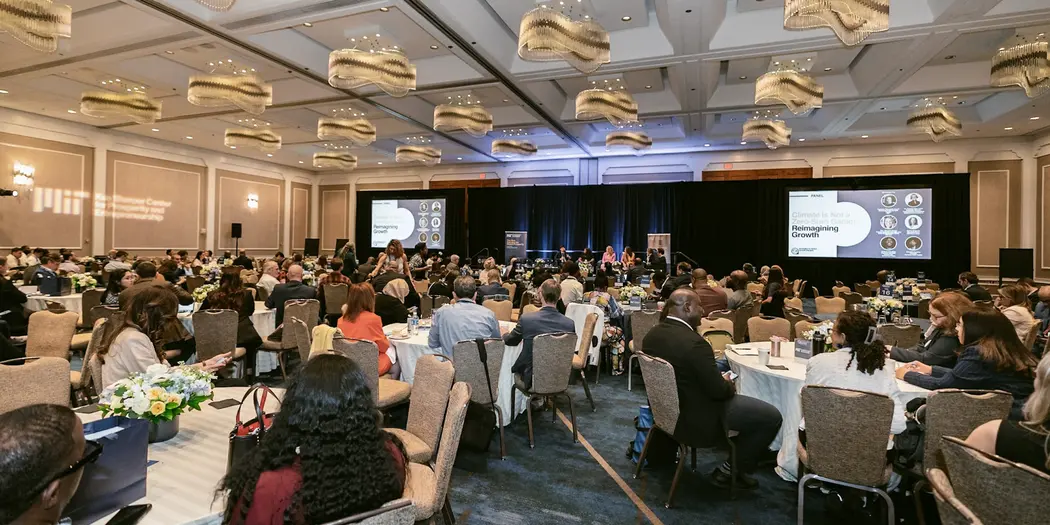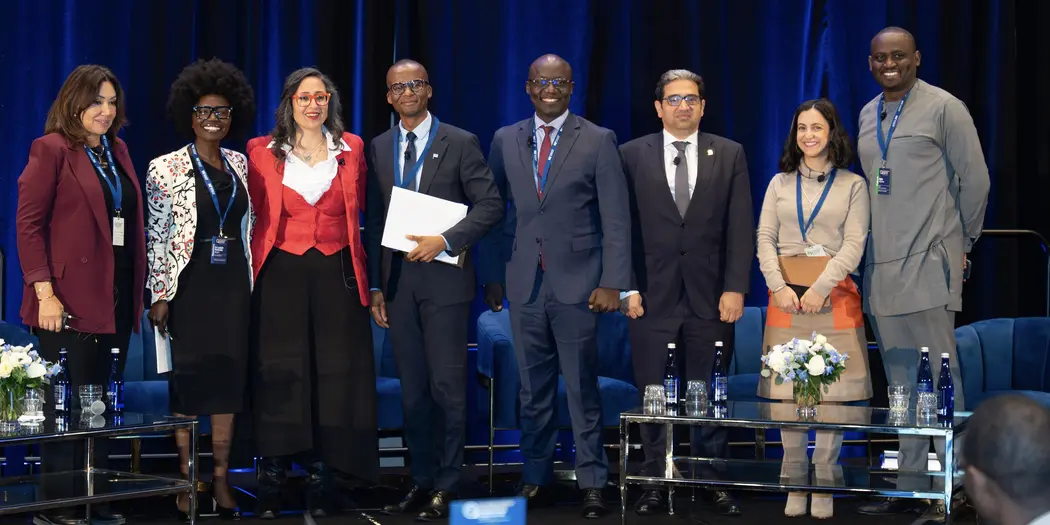The newly named MIT Kuo Sharper Center for Prosperity and Entrepreneurship wants to change the story around global growth markets.
“It is not that we are on the rise or that we are becoming. Our time is now. We are not rising. We are not still becoming. We are here, we are strong, and it is up to us to create the prosperity that we need,” said the center’s executive director, Dina Sherif, during the opening session of the center’s annual “Innovation in Global Growth Markets: Prosperity Through Entrepreneurship” conference in April.
This year’s conference, “Building the Right Foundations to Thrive,” celebrated the potential and success of global growth markets while discussing strategies to address barriers to continued entrepreneurial growth. Over 300 attendees from all over the world gathered for the two-day conference, which featured over 80 speakers and included panels, workshops, keynote speeches, and book signings.
Attendees at the MIT Kuo Sharper Center for Prosperity and Entrepreneurship's April 2025 conference.
Credit: Courtesy of the MIT Kuo Sharper Center for Prosperity and Entrepreneurship
A new identity and mission
The conference also marked a turning point in the center’s own story. During her opening speech, Sherif announced the center’s new name. Previously known as the Legatum Center for Development and Entrepreneurship at MIT, having been supported by the Legatum Group, the center’s new identity was catalyzed by a generous gift from Sayuri (Kuo) Sharper, SB ’81, SM ’82, and Craig Sharper, SM ’80.
“We are deeply grateful for the vision, the belief, and the support that the Legatum Group has invested in this journey. But today, as we look towards the future, we do so with a new identity, one that reflects both continuity and ambition for a deeper footprint and a rapid expansion of our programs across global growth markets,” said Sherif, referring to the center’s suite of programs that include fellowships for student entrepreneurs and Africa-based startup founders. She explained that the center’s new mission is to “create a new calculus for global prosperity.”
Sherif showed the conference attendees a new video that explained the evolution of the center’s identity and mission. The center’s work is made possible by a community of global entrepreneurs and supporters, a community that resonates with Sayuri Sharper.
“Each individual, you may feel like there's not too much you can change, but look for other folks that have a common vision to you,” said Sayuri Sharper in the video. “And I find that there are actually a lot of us who are trying to make life better for the next generation.”
According to Georgia Perakis (John C Head III Dean (Interim); Professor of Operations Research, Operations Management, and Statistics), the evolution of the center reflects the broader MIT community’s committing to improving the world.
“This exciting evolution reflects a bold vision for the future of the center, one that's rooted in MIT's values and is propelled by entrepreneurial spirit and desire to have impact in the world,” said Perakis.
Collaboration for shared prosperity
Kuo Sharper Center Faculty Director Dame Fiona Murray (Associate Dean for Innovation; William Porter (1967) Professor of Entrepreneurship) discussed how the center is approaching making this impact through identifying the components of the center’s proposed new calculus for global prosperity. In her talk, “The Building Blocks for Thriving Entrepreneurship and Innovation Ecosystems,” Murray mentioned that creating this new calculus would require global growth markets to use their unique assets and experiences to lead in innovation as well as be open to new entrepreneurial solutions and create mutually beneficial partnerships.
Florian Schattenmann, PhD '97, chief technology officer and vice president at Cargill, speaking on the panel, "The Role of Large Corporations in Leveraging Entrepreneurship & Innovation for Shared Prosperity."
“We’ve got to lean into our advantages to actually leapfrog and lead in certain things, so that we can show up in those partnerships with something to bring to the table with our own leading innovations, with our own domestic advantages,” noted Murray.
The importance of partnership and collaboration was reiterated in panels such as “How Entrepreneurship Can Change the African Narrative: Growth Markets as Drivers of Global Innovation,” which discussed entrepreneurship as a means through which Africa can reclaim its narrative as a region with immense potential. The panel included the Honorable Ndaba Nkosinathi Gaolathe, the vice president and minister of finance of Botswana. Last year, Botswana entered into a five-year collaboration agreement with the center to cultivate a culture of innovation and entrepreneurship—an essential step in the country’s journey from reliance on natural mineral resources to a knowledge-based economy capable of transforming lives and driving sustainable economic growth.
“This partnership is about creating ecosystems,” said Gaolathe. “Ecosystems that nourish us, our knowledge base ecosystems that help bring out the best out of our people. Ecosystems that help us build institutions.”
The conference emphasized that these entrepreneurial ecosystems require different perspectives and skillsets. The panel, “The Role of Large Corporations in Leveraging Entrepreneurship & Innovation for Shared Prosperity,” discussed how corporations and entrepreneurs can work together to address important issues. Florian Schattenmann, PhD ’97, chief technology officer and vice president at Cargill, highlighted why the company works with entrepreneurs and startups at different stages.
“When we look at the challenges [in agriculture], drought resistant crops, supplies, food secure supply chains, sustainability in our supply, these are challenges no one university, no one company, no one startup can actually solve,” said Schattenmann. “The way we look at this is, innovation has to be the ultimate team sport.”
The panelists and moderator of the conference's "How Entrepreneurship Can Change the African Narrative: Growth Markets as Drivers of Global Innovation" panel. From left to right: Abla Abdel Latif, Lydiah Kemunto Bosire, Dina Sherif (moderator), The Honorable Ndaba Nkosinathi Gaolathe, H.E. Ambassador Philip Thigo, Haytham ElMaayergi, Iness Elamine, and Ayo Soptian.
Credit: Courtesy of the MIT Kuo Sharper Center for Prosperity and Entrepreneurship
Supporting entrepreneurial impact
Many panelists mentioned the importance of using innovation to serve their local communities. “Unlocking Entrepreneurship & Innovation for Regional Prosperity in Central Asia” underscored the value of developing both international and local startups in the region.
Dina Ruslan, founder and CEO of Codify, an information technology school in Kyrgyzstan, explained that founders in Central Asia are often encouraged to move their businesses outside the region to achieve success. She would like to see more support for startup founders serving customers in their local communities.
“What if [startup success was] measured by how much impact we made at home in Central Asia? How many people and customers [we] have actually served?” asked Ruslan.
A path forward for global prosperity
As the conference came to a close, one message rang clear: the path to sustainable prosperity in global growth markets must be shaped by those who live it, lead it, and build it. The MIT Kuo Sharper Center for Prosperity and Entrepreneurship stands ready to serve as a space for this work—a home for global innovation stakeholders, visionary entrepreneurs, and mission-aligned nations to come together to reimagine what’s possible.
With a reach that extends deep into emerging ecosystems, the center is more than a platform—it is a bridge between ideas and action, between local ingenuity and global collaboration. Whether through convenings like this one, partnerships with forward-looking governments, or fellowships that back bold entrepreneurial talent, the center is advancing a new calculus for prosperity—one built on shared purpose, equitable opportunity, and the power of innovation to transform lives.
For those committed to building a more prosperous future across growth markets, the center is a trusted partner, a conveyor of possibility, and a catalyst for enduring impact. Sherif ended the conference by expressing her enthusiasm for collaborating with the conference’s attendees.
“We at the center welcome all of you,” said Sherif. “Use us as a medium. Use us as a way to connect. We’re here for you and we want to support your work.”





